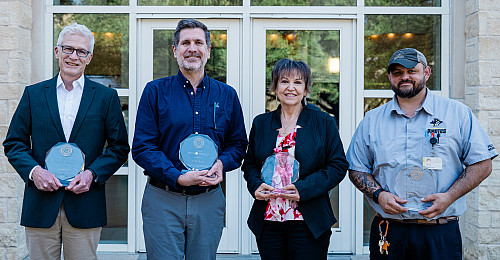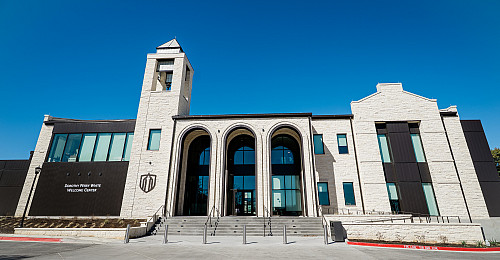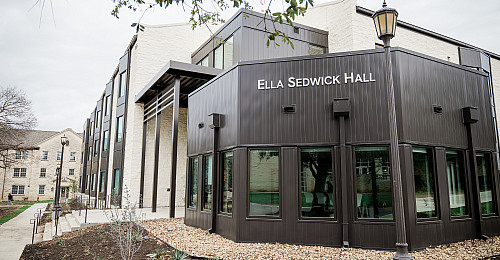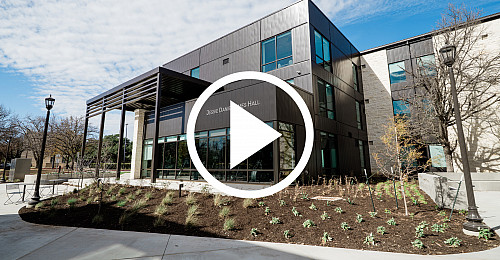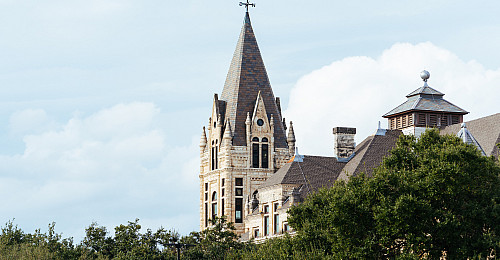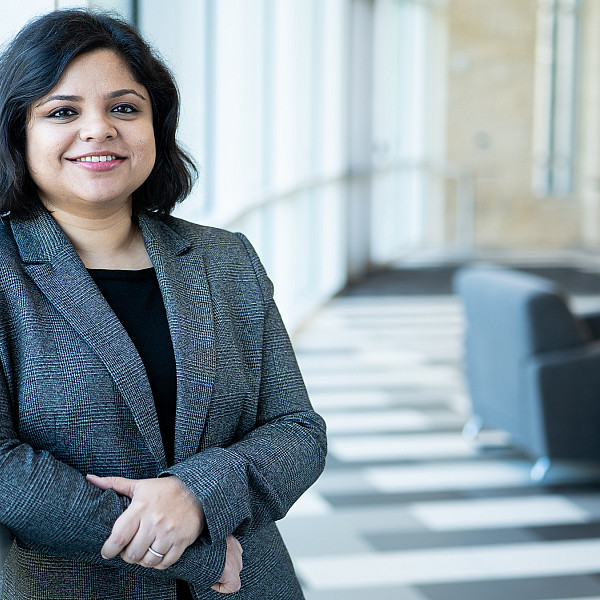News
Meet Our World-Class Faculty: Arjun Chandrasekhar
A conversation with Assistant Professor of Computer Science Arjun Chandrasekhar.
May 17, 2023
May 17, 2023
Open gallery

Could you introduce yourself and tell me a bit about your background?
My name is Arjun Chandrasekhar. I was born in Phoenix, Arizona, and studied computer science at Caltech in Pasadena, California. I got my Ph.D. at UC San Diego in La Jolla, California, where I studied computational biology and bioinformatics. My research is focused on why nature is better at computer science than humans. For example, why are ants so good at finding food in the kitchen without using a map?
What inspired you to pursue a career in computer science, and why did you want to be a professor?
I took an AP computer science course in high school during my freshman year, and I liked it; it seemed to come naturally to me. I always felt a solid sense of accomplishment from getting a program to work correctly. Then, when I took classes about the more mathematical side of computer science, I enjoyed those so much that it made me want to go into academia and research. What made me want to be a professor was when I was in grad school, I liked my research, but I enjoyed being a teaching assistant a lot more, so I became an adjunct lecturer. I taught part-time at another college in the area, which was my best experience in grad school. After that, I knew becoming a professor made the most sense.
How did you hear about Southwestern, and why did you want to work here?
I was a lecturer at Pitt a few years ago, but I wanted to find a tenure-track position. My wife and I were focusing on California. When she was searching job sites, she found this school right outside Austin, Texas, which was exactly what I was looking for. I applied here, and everything about it felt natural when I visited. I especially liked getting to know the other faculty in the computer science department.
What classes do you teach?
I’m teaching an intro computer programming class and an elective called theory of computation. It has not been taught at Southwestern in a long time, but it’s something that you see more often as a requirement for computer science at a bigger school. It’s about the work that Alan Turing did. The course is about his findings, and it’s one of the courses that I took in college and motivated me not to want to be an engineer but to be a researcher.
Are you currently working on any research projects?
My research studies natural systems like ant colonies or the brain and tries to see how those systems solve problems and if we can use that to come up with algorithms that we can use. Right now, my focus is on how the root architecture of tomato plants grows. My collaborator at Cornell studies tomato plants; she grows them, and she gets pictures of how the roots grow. And what we found in an earlier paper was that if you look at the roots they grow, they are good at optimizing trade-offs between conserving materials but also transporting resources efficiently to the base of the plant. We wrote a paper stating the system is efficient without needing all the sophistication we can access. We study them to determine how to grow efficient transportation networks like public transit networks. We just received a grant to work on this further. We will evaluate how sensitivity to gravity plays a role in the different shapes that the architecture takes. Eventually, we want to study how they grow over time and get pictures one second to the next and use that to derive an algorithm for how you can develop a network architecture. Eventually, we will apply that to see how you might want to grow a public transit system over time, especially as a city scales.
How have you enjoyed your time at Southwestern thus far?
I have enjoyed my time here. It’s unique that the faculty and those outside the computer science department all seem close to each other. We all have similar interests. Also, the students I’ve met here have been friendly, and I’ve liked getting to know them.
What are you looking forward to in the coming semesters?
I taught discrete mathematics and found another instructor in Colorado who teaches discrete mathematics, and I liked his curriculum. He’s setting up an interactive textbook, so I reached out to him, and he’s willing to share materials with me, and I’m looking forward to that. I also look forward to starting research with two undergrad students this summer.
What do you enjoy doing outside of work?
My wife and I are really into board games, and we like to go on at least one hike every couple of weeks. I was interested in Austin because I have a personal blog about movies and college football, which Austin is known for. So, I like Saturdays in the fall. I tell my students that if they email me on a Saturday in the fall, they won’t get an answer because I’m watching football all day.
Who is your favorite director, and what is your favorite movie?
Richard Linklater is my favorite director, and Before Sunset is my favorite of his films.
What is something students would be surprised to learn about you?
I have a website for academics, but I also use it for my course materials. Nothing is hidden behind Moodle, and I tell students on day one this is where all the materials are. Students say they like how my website looks and think I must know how to program. But I only know some HTML. When I made my website, I had a friend in grad school who had a great website, so I inspected the source code for her page and used that to make mine. I don’t know much; I don’t know JavaScript or CSS, only a bit of HTML, and students will be surprised to know that.
Do you have any advice for students pursuing a career in computer science?
Be curious and learn how to use the command line.
Help support our world-class faculty like Arjun by making a gift to Southwestern.


